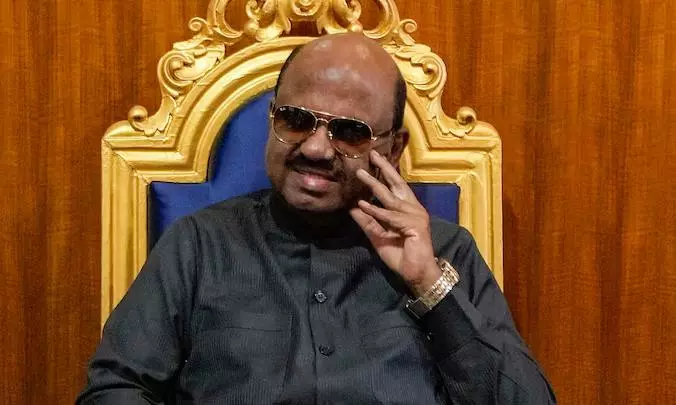
- Home
- India
- World
- Premium
- THE FEDERAL SPECIAL
- Analysis
- States
- Perspective
- Videos
- Sports
- Education
- Entertainment
- Elections
- Features
- Health
- Business
- Series
- In memoriam: Sheikh Mujibur Rahman
- Bishnoi's Men
- NEET TANGLE
- Economy Series
- Earth Day
- Kashmir’s Frozen Turbulence
- India@75
- The legend of Ramjanmabhoomi
- Liberalisation@30
- How to tame a dragon
- Celebrating biodiversity
- Farm Matters
- 50 days of solitude
- Bringing Migrants Home
- Budget 2020
- Jharkhand Votes
- The Federal Investigates
- The Federal Impact
- Vanishing Sand
- Gandhi @ 150
- Andhra Today
- Field report
- Operation Gulmarg
- Pandemic @1 Mn in India
- The Federal Year-End
- The Zero Year
- Science
- Brand studio
- Newsletter
- Elections 2024
- Events
- Home
- IndiaIndia
- World
- Analysis
- StatesStates
- PerspectivePerspective
- VideosVideos
- Sports
- Education
- Entertainment
- ElectionsElections
- Features
- Health
- BusinessBusiness
- Premium
- Loading...
Premium - Events

The governor is the only one to enjoy constitutional immunity along with the President; the next course of action by Kolkata police will be interesting
The complaint of alleged sexual harassment filed by a contractual worker against West Bengal Governor CV Ananda Bose has opened up the debate on the constitutional immunity to governors.
Under Article 361(2) of the Constitution, “No criminal proceedings whatsoever shall be instituted or continued against the President, or the Governor of a State, in any court during his term of office”.
The Kolkata police have established a special enquiry cell to investigate the allegations. They reportedly issued notices to certain Raj Bhavan officials and sought CCTV footage, if available.
Governor’s diktat
On May 5, Governor Bose directed the Raj Bhavan staff to ignore any police summons regarding the complaint.
In a post on X, he said: “The question that arises is whether the police can conduct an inquiry and collect evidence in view of the immunity enjoyed by the governor....”.
Bose, while issuing directions to the staff not to cooperate, went on to assert: “The purpose of an inquiry or investigation on the part of the police in the subject case is the collection of evidence which culminates in the submission of final report to the jurisdictional magistrate under Section 173 of the Criminal Procedure Code and since the governor has been granted constitutional immunity from any criminal proceedings being instituted or continued against him, it logically follows that the police cannot investigate/inquire into the matter in any manner whatsoever.”
Absolute immunity
There is no doubt that Governors enjoy absolute immunity under Article 361(2) of the Constitution while in office and the apex court has upheld the same in a number of judgments.
Even though Governors enjoy absolute immunity from civil and criminal proceedings, then Madhya Pradesh Governor Ram Naresh Yadav was issued notice by the Supreme Court on November 20, 2015 regarding a petition seeking his removal as the Governor for his alleged involvement in the forest guard recruitment scam in the state.
The apex court, however, had withdrawn its notice issued to the then Arunachal Pradesh Governor Jyoti Prasad Rajkhowa regarding a petition challenging the Centre’s recommendation for the imposition of President’s rule in the state based on his recommendation. Rajkhowa nonetheless lost the pleasure of the President following the Supreme Court judgment on the issue.
The critical issue is whether the governor's immunity vis-à-vis criminal proceedings bars investigation into any alleged offence.
Evidence on oath
Section 2(h) of the CrPC (Code of Criminal Procedure) defines “investigation” as “all the proceedings under this Code for the collection of evidence conducted by a police officer or by any person (other than a Magistrate) who is authorised by a Magistrate in this behalf”.
Under Section 2(i) of the CrPC, “judicial proceeding”, is defined as “any proceeding in the course of which evidence is or may be legally taken on oath”. The catch is “on oath”.
Obviously, the police cannot take the evidence on oath and the evidence under oath can only be taken by the Magistrate under Section 164 of CrPC. Furthermore, each investigation into a complaint need not lead to the registration of an FIR unless an offence is made out. If the FIR is not registered, the question of submitting a final report under Section 173 CrPC does not arise.
Therefore, whether the collection of evidence without taking oath falls under the definition of criminal proceedings as provided under Article 361 is an issue.
Criminal proceedings
In common parlance, criminal proceedings are understood as the action taken in a court to bring a criminal prosecution. Article 361 bars criminal proceedings before “any court” but the objective of providing immunity under Article 361 remains one of the critical factors.
Then Meghalaya Governor V Shanmuganathan faced allegations of sexual harassment of women at Raj Bhavan. No complaint was filed with the police against him. However, a complaint was filed with Prime Minister Narendra Modi. Shan resigned on January 27, 2015.
Probe not prohibited
Thus far, the Supreme Court has not prohibited investigation in cases where there is a bar against “prosecution, suit or other legal proceeding” under the Armed Forces Special Powers Act, 1958.
The apex court, however, reiterated the need for prior sanction for prosecution wherever the laws provided the bar on taking cognizance without prior sanction of the competent authorities.
The Governor is not like other public servants; he is the only one to enjoy constitutional immunity along with the President. The next course of action by the Kolkata Police in light of the order issued by Governor Bose on May 5 will be interesting.
(The Federal seeks to present views and opinions from all sides of the spectrum. The information, ideas or opinions in the articles are of the author and do not necessarily reflect the views of The Federal)


